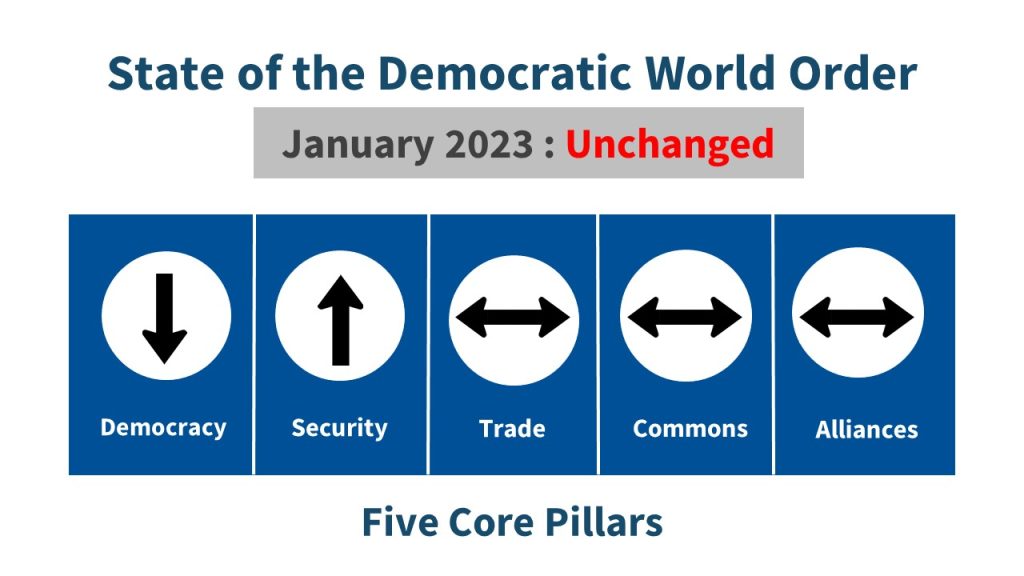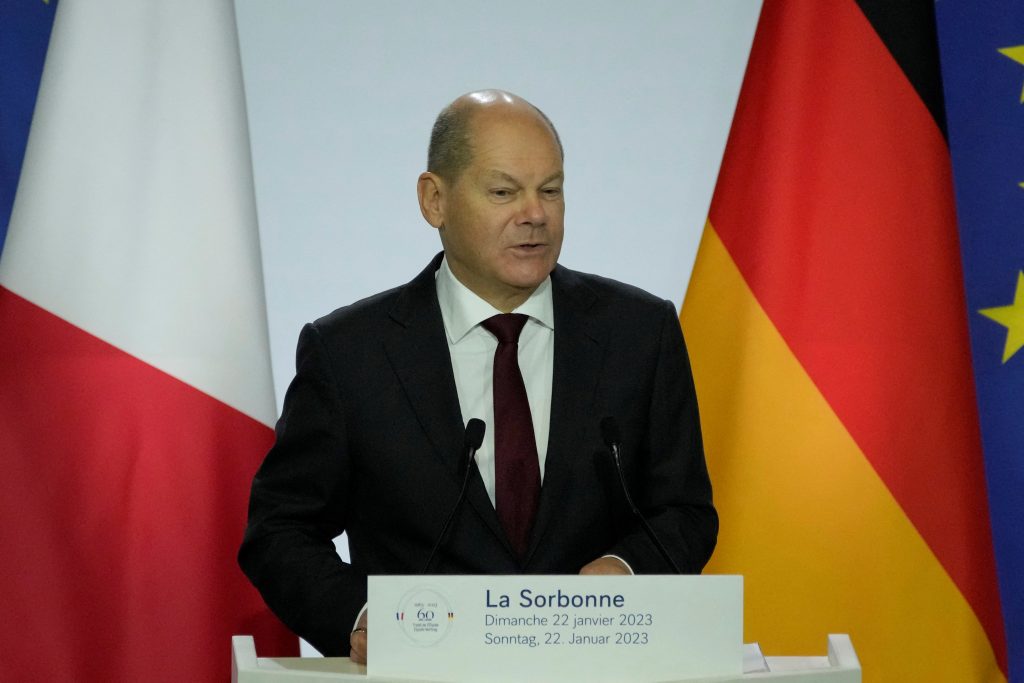Reshaping the order
This month’s topline events
Allies Unite on Tanks. After weeks of wrangling, Germany and the United States agreed on a way forward to provide large numbers of modern tank systems to Ukraine. Berlin will deliver fourteen Leopard 2s, clearing the way for other European allies to send scores more, while Washington pledged dozens of M1 Abrams. Separately, Britain will send several Challenger 2 tanks. The moves come as Russia secured its first major battlefield advance in months, taking control of the town of Soledar as it prepared for a larger winter assault. Russian officials warned that the tank deliveries could lead to “a new level of confrontation.”
- Shaping the order. The delivery of the heavily-armed tanks — among the most powerful offensive weapons systems provided to Ukraine so far — will considerably boost Kyiv’s fighting capabilities and could allow Ukrainian troops to break through Russian defenses and take back captured territory. The move also reaffirmed alliance solidarity, sending a strong signal to the Kremlin that the US and its NATO allies are determined to stay united in support of Ukraine.
- Hitting home. Russian aggression, if allowed to succeed, would undermine European security and lead to a world that is more dangerous for Americans.
- What to do. The US and Europe should follow this bold move by responding favorably to Ukrainian President Volodymyr Zelensky’s request for fighter jets and longer-range weapons, the provision of which could make a significant difference in Ukraine’s ability to push back Russian forces.
South Africa Warms to Russia. While Russian Foreign Minister Sergey Lavrov was on a visit to Pretoria, South Africa’s foreign minister Naledi Pandor lauded the growing “political, economic, social, defense and security cooperation” between the two nations and announced that South Africa will join Russia and China in joint military exercises next month. The meeting was a prelude to South Africa’s hosting of the BRICS summit in August. In response, the White House expressed concerns about any “country … exercising with Russia as Russia wages a brutal war against Ukraine.”
- Shaping the order. Despite US and European efforts to isolate Russia in the wake of its assault on Ukraine, the Kremlin has been able to maintain a close working relationship with South Africa and to some degree India and Brazil — major democracies that are lending support to Moscow in one way or another. As China also makes inroads in Africa and Latin America, competition in the Global South has become a defining feature of the international order.
- Hitting home. Americans would be safer in a world where nations that share common values are working together to weaken and isolate aggressive dictators.
- What to do. The Biden administration will need to find new approaches to incentivize democracies in the Global South to join in efforts to uphold the rules-based order.
Rioters Storm Brazil’s Capital. Thousands of supporters of Brazil’s former President Jair Bolsonaro stormed the National Congress, presidential palace, and Supreme Court in the nation’s capital. While the Congress was not in session and newly inaugurated president Lula da Silva was out of town, the attack defaced government buildings and left a trail of destruction across Brasília as protestors claimed that the recent presidential election was marred by widespread fraud. President Biden and other world leaders condemned the assault and affirmed their support for Brazil’s democracy.
- Shaping the order. The attack on the capital of South America’s largest democracy echoed that of the January 6 assault on the US Capitol and dramatically illustrates the erosion of democratic norms that many nations around the world have experienced in recent years. But with the violence quickly stemmed and large numbers of those involved taken into custody, the aftermath also highlights the resilience of Brazil’s democratic institutions.
- Hitting home. Americans need to stay vigilant to defend democratic institutions from forces — internal or external — that may seek to undermine them.
- What to do. Washington should continue to support President Lula’s efforts to restore order in Brazil and use the upcoming Summit for Democracy to rally democracies worldwide to uphold shared norms and principles.
Quote of the month
“[T]he most important thing [is] … that countries that believe in democracy, in the rule of law… stand together. And when we see that authoritarian regimes are coming closer, working closer together in the political, in the diplomatic domain, but also in the military domain, it is even more important that we stand together as countries believing in the rules-based international order.”
– NATO Secretary General Jens Stoltenberg in South Korea, January 30, 2023

State of the Order this month: Unchanged
Assessing the five core pillars of the democratic world order
Democracy (↓)
- Rioters stormed the Brazilian National Congress, presidential palace, and Supreme Court in the nation’s capital, claiming that the recent presidential election won by Lula da Silva was marred by widespread fraud. But order was quickly restored.
- India banned a BBC documentary criticizing Prime Minister Narendra Modi’s alleged role in Hindu-Muslim riots more than 20 years ago and arrested students at university screenings — actions criticized as assaults on freedom of speech and freedom of the press.
- With Venezuela’s autocratic leader Nicolás Maduro maintaining his grip on power, the US and the EU withdrew recognition of Juan Guadió as interim president of Venezuela, following a decision by the opposition-controlled National Assembly to remove him.
- On balance, the democracy pillar was weakened.
Security (↑)
- In a significant boost for Ukrainian security forces, the US agreed to send 31 Abrams tanks to Ukraine, paving the way for Germany and other European allies to send several dozen German-made Leopard 2s.
- In a break with previous policy, South Korean President Yoon Suk-yeol said he would consider asking the US to position nuclear weapons on the peninsula or have South Korea develop its own, if the threat from North Korea continues to escalate.
- Citing different “democracy and justice systems,” Fiji terminated a police training agreement with China while allowing agreements with Australia and New Zealand to stand.
- Israel conducted a drone attack against a military complex in Isfahan, a major center for Iran’s ballistic missile research and production.
- A Palestinian terrorist killed seven people during Friday night prayer services outside a synagogue in East Jerusalem as tensions mounted between Israel and Palestine.
- With the US and allied decisions on tanks, the security pillar was strengthened.
Trade (↔)
- President Biden joined Mexican President Andrés Manuel López Obrador and Canadian Prime Minister Justin Trudeau for the North American Leaders’ Summit in Mexico City, discussing supply chains and securing the “technologies of the future in North America.”
- The European Union is prioritizing 70 infrastructure projects around the world, with plans to invest over $320 billion as part of its Global Gateway initiative that seeks to offer developing countries an alternative to China’s Belt and Road Initiative.
- While positive, these developments were relatively limited in scope, and the trade pillar was unchanged.
Commons (↔)
- China reopened its borders to international travel after three years, as Chinese officials claimed COVID-19 cases had peaked across the country — though health experts suggested it was still too early to confirm.
- The US, Canada, and Mexico issued a joint declaration pledging to meet their national commitments under the Paris Agreement, while working to keep the 1.5°C temperature goal within reach.
- Overall, the global commons pillar was unchanged.
Alliances (↔)
- Turkish officials indicated that Ankara is unlikely to ratify Sweden and Finland’s bids for NATO membership for now and will reconsider the matter after regional elections in May or June, due to concerns over the presence of Kurdish organizations in Sweden.
- NATO Secretary General Jens Stoltenberg, on a visit to Japan and South Korea, highlighted the challenges posed by China and reaffirmed the importance of NATO’s Asia-Pacific partnerships.
- Britain and Japan signed a security agreement granting reciprocal access to each nation’s military forces, described by a British official as the “most significant defence agreement between the two countries in more than a century.”
- In a sign of improving relations, South Korea and Japan plan later this year to restart joint military exercises that were suspended in 2018.
- With India’s national security advisor visiting Washington, the US and India held an inaugural meeting of a new joint initiative on critical and emerging technologies intended to boost defense and technology cooperation between the two nations.
- On balance, and given the significance of Turkey’s decision, the alliance pillar was unchanged.
Strengthened (↑)________Unchanged (↔)________Weakened (↓)
What is the democratic world order? Also known as the liberal order, the rules-based order, or simply the free world, the democratic world order encompasses the rules, norms, alliances, and institutions created and supported by leading democracies over the past seven decades to foster security, democracy, prosperity, and a healthy planet.
This month’s top reads
Three must-read commentaries on the democratic order
- Michael McFaul, in Foreign Affairs, argues that now is the time for allies to go big with military assistance to Ukraine to produce a breakthrough on ending the war.
- Boris Johnson, in The Washington Post, makes the case for NATO membership for Ukraine.
- Mary Lovely, in Foreign Affairs, contends that for friend-shoring to work in the Indo-Pacific, the US needs to offer preferential market access to those who agree to new trade provisions on China.
Action and analysis by the Atlantic Council
Our experts weigh in on this month’s events
- Dan Fried, in the New Atlanticist, weighs in on Germany’s decision to send Leopard tanks to Ukraine.
- Matthew Kroenig and Emma Ashford, in Foreign Policy, debate Turkey’s role in NATO and whether the state helps or harms the alliance.
- Nicole Bibbins Sedaca, in Perspectives, outlines how both sides of the American political spectrum need to unite against the true enemies of democracy.
__________________________________________________
The Democratic Order Initiative is an Atlantic Council initiative aimed at reenergizing American global leadership and strengthening cooperation among the world’s democracies in support of a rules-based democratic order. Sign on to the Council’s Declaration of Principles for Freedom, Prosperity, and Peace by clicking here.
Ash Jain – Director for Democratic Order
Dan Fried – Distinguished Fellow
Sydney Sherry – Project Assistant
If you would like to be added to our email list for future publications and events, or to learn more about the Democratic Order Initiative, please email AJain@atlanticcouncil.org.
Image: German Chancellor Olaf Scholz delivers a speech at the Sorbonne University during a ceremony to celebrate the 60th anniversary of the Elysee Treaty in Paris, France January 22, 2023. Christophe Ena/Pool via REUTERS
